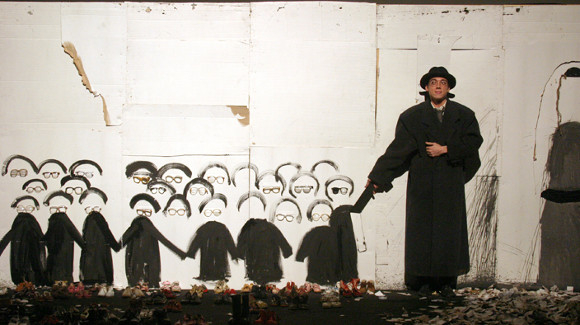Opus No 7 (Barbican Theatre)

© Natalia Cheban
The best theatre, like the best music, defies analysis. So it is impossible, except in the broadest, crudest, terms, to say exactly what this extraordinary theatrical bombardment by the painter-turned-director Dmitry Krymov and his Moscow Theatre of Dramatic Art is "about."
Opus No 7 – presented by the Barbican and the biennial London International Festival of Theatre, LIFT – is compiled of two hour-long slabs of visceral, overwhelming performance, conceived as an anti-patriotic howl of protest at Stalin’s post-War anti-Semitic campaigns and the ironic celebration of the greatest of all twentieth century Russian composers, Dmitri Shostakovich.
The recorded music we hear is of the piano trio that Shostakovich weaved from Jewish folk songs, and the mighty tread of the Seventh Symphony which is sometimes thought to reflect the siege of Leningrad but is equally taken here to represent the anger and creative suppression of the artist in Stalin’s Russia: we hear the reedy voice of the composer mouthing propaganda; we see him destroyed by a huge and ridiculous puppet manifestation of Mother Russia.
It’s this humanitarian dichotomy in listening to Shostakovich that is attempted in a show that begins with a Wailing Wall of cartoon daubs literally blown away in the rushing wind and later fills the stage with a dodgem car circus ring of clashing, rusting, disintegrating grand pianos. This is not theatre that proceeds with rational argument or discussion, but with big, bold brush strokes of physical action painting.
British audiences had a taste of Krymov in his outrageous version of A Midsummer Night’s Dream (As You Like It) at Stratford-upon-Avon last year; his parentage (the great director Anatoly Efros and the prominent critic Natalia Krymov) and his cultural lineage – Meyerhold, Lyubimov, Vasiliev, all directors familiar to LIFT aficionados – make this an absolute must-see, authentic theatrical experience.
This is not just a case of critical name-checking, but of historical fact: the grim, fatalistic subject matter of Opus 7 is indistinguishable from the visual representation of a nation’s political history, the repetitive imagery of Shostakovich’s cruel and rimless spectacles, the anguish in his music, the radical traditions of the Russian stage, the profusion of blood red gloves and the inevitable arrival of another pram, another child, another victim.










